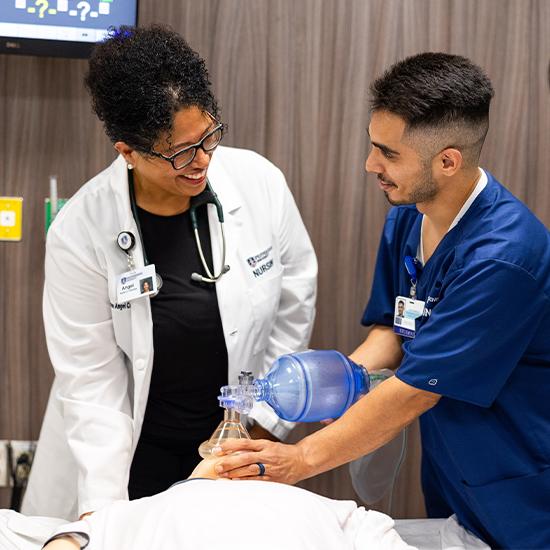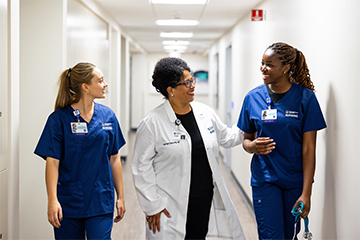Dean Angel Coaston Aims to Launch a Nursing Program at Pepperdine That Shapes Compassionate Healthcare Leaders

Angel Coaston’s path to becoming the founding dean of Pepperdine’s School of Nursing at the College of Health Science is not just a career trajectory—it is a testament to the power of faith, perseverance, and an unwavering commitment to serve others. For Coaston, nursing is more than a profession; it is a divine calling.
“Nursing is a tough path, but when you're called—when you're truly anointed by God to care for others—then you can weather any storm no matter how challenging,” she says.
As the 12th of 14 siblings, Coaston embraced the values of compassion, service, and love at a young age, following the example set by her parents. Their dedication to caregiving extended beyond their own children, as they welcomed 12 foster siblings into their home and created an environment where faith and kindness were central to everyday life. Grounded in the principles of loving God and loving people, Coaston’s parents instilled in her a deep appreciation for caregiving and service that naturally carried over into her future career. They taught her to love Jesus not just through words but by their own actions that demonstrated generosity and unwavering care for others.
Her path to nursing was further inspired by her brother-in-law, who not only encouraged her to pursue the field but also helped her gain entry into the Community Hospital School of Nursing in Springfield, Ohio.
“From a young age, I helped take care of my older siblings' children, and I believe that’s where my passion and gift for nursing truly began,” Coaston reflects.
This nurturing instinct fueled her desire to make a difference in the lives of those in need, particularly the most vulnerable. Early in her career, Coaston worked with children and infants from difficult backgrounds—many suffering from the devastating effects of drug addiction, particularly crack cocaine. These were the formative years as Coaston honed in her craft—affectionately referring to herself as the “Baby Whisperer”—where her innate ability to comfort and connect with these infants cemented her dedication to nursing.
Coaston’s drive to expand her expertise led her to the high-stakes environment of the emergency room, where she gained critical experience treating patients with seizures and other acute conditions. Recognized early for her leadership abilities, she became an emergency room supervisor at just 21 years old, demonstrating remarkable capability and dedication at a young age.
"Working in the emergency room was an incredible learning experience. I was constantly exposed to a wide range of traumas—from severe illnesses and heart attacks to gunshot wounds,” Coaston recalls. “While the tragedies were difficult to witness, nothing could have better prepared me or contributed more to my growth as a nurse."
Despite her growing leadership roles, Coaston remained committed to hands-on patient care. Understanding the value of staying connected to clinical practice, she earned her Family Nurse Practitioner license in 2011. Her passion for nursing education led her to Azusa Pacific University, where she transitioned into academia while also working to support the university’s regional campus.
Throughout her career, Coaston has drawn inspiration from her faith to advocate for underserved communities. Reflecting on her over 20-year involvement with Water of Life Community Church, Coaston shares that she was tasked to help license the church's mobile clinic, despite having no prior experience.
“I believe that in life, saying yes—even when you don’t know what you’re doing—can be a divine experience,” says Coaston. “It’s like a divine appointment, where simply saying yes and being obedient to the request can lead to something greater.”
She learned quickly and eventually took over the ministry, growing it from serving 74 patients in the first year to offering more services through grants. To help fund the clinic, Coaston wrote her first successful grant for $300,000, which allowed her to expand the clinic's offerings, including becoming a licensed primary care and pharmacy clinic. She also built a volunteer-driven team to serve underserved communities in San Bernardino County, which offered free healthcare services. The clinic prioritized not only medical care but also spiritual care, with volunteers praying with every patient. Coaston’s work with the clinic contributed to her PhD research on its impact, particularly on diabetes care.
 Dean Angel Coaston with nursing students
Dean Angel Coaston with nursing students
As the first dean of Pepperdine’s School of Nursing, Coaston envisions a biblically rooted, Christ-centered program that integrates faith with academic excellence and compassionate care. She emphasizes the importance of grounding nursing students in their relationship with God, fostering self-awareness in their identity in Christ, and instilling a perspective that aligns with seeing people as God does.
She explains that the curriculum will be designed to blend biblical principles with the American Association of Colleges of Nursing essentials, incorporating scripture into the foundation of the program. Additionally, Coaston highlights Jean Watson's Caring Theory as a key theoretical framework which reinforces the importance of compassion in nursing practice. Ultimately, her vision is to develop nurses who not only excel in clinical skills but also embody a deep sense of faith, purpose, and compassionate care in their profession.
“The priority for me is to create a curriculum that allows students to develop a personal experience with God, to become self aware about who they are as a person and their identity with Christ, and then share that with the world,” says Coaston.
Coaston sees the greater potential of Pepperdine’s BSN and ELM nursing programs and envisions the nursing profession evolving by returning to its core as a compassionate and caring art, rather than just a science. She hopes to see more emphasis on empathy and compassion in nursing, with community-based learning being a key part of the program. Through this approach, nursing students will engage with people in their daily lives, which will help them look beyond medical conditions and view patients as individuals with names and stories. Coaston believes this method will humanize nursing and transform how future nurses provide care.
“I believe that if students can see people in their everyday lives—where they live, work, play, and pray—they’ll realize that patients aren’t just numbers or hospital beds; they’re individuals with names.” Coaston adds, “By teaching students in the community and immersing them in these experiences, we can show them that patients are just like their own family, and we should care for them the way we would want to be cared for.”
Coaston’s advice to aspiring nurses is simple yet profound: nursing is a calling, not just a career. She encourages students to evaluate their motivations, ensuring they enter the field for the right reasons. Additionally, she stresses the importance of reconnecting with the core values of nursing, emphasizing that healthcare workers driven by compassion and a genuine commitment to patient well-being can make a profound difference in people's lives.
"I hope our program will drive meaningful change in the healthcare industry, fostering the evolution of nursing while bringing hope to those in need,” she says. “I believe we are called to care for the broken, and with compassionate leadership, our students will be equipped to make a profound impact on healthcare."